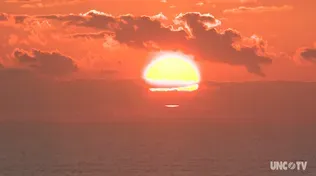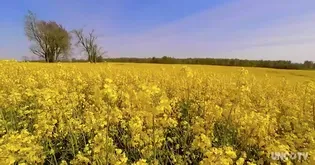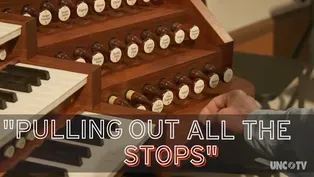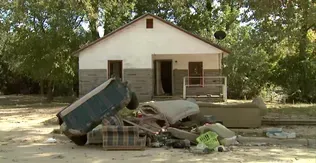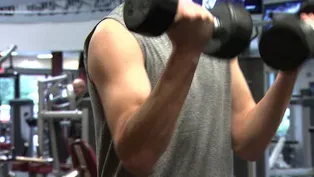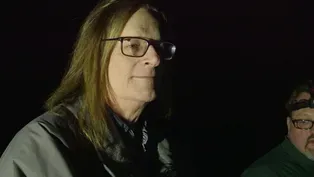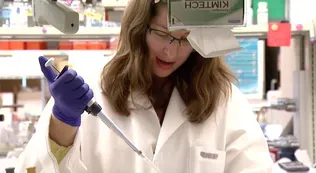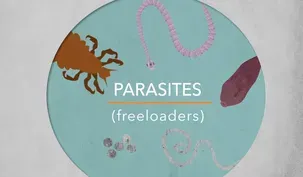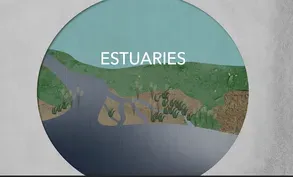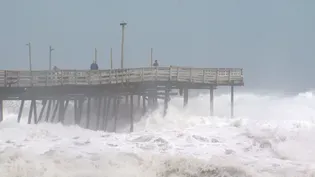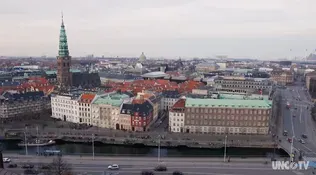
NC Science Now: Science of Bacteria in Water
Clip: Season 3 | 5m 36sVideo has Closed Captions
Frank Graff looks at the science behind properly cleaning up from a hurricane.
Hurricane Matthew's floodwaters are receding in places but it's the mess, left behind, that could be dangerous. North Carolina Science Now's Frank Graff explains the hazards of cleaning up.
Problems with Closed Captions? Closed Captioning Feedback
Problems with Closed Captions? Closed Captioning Feedback
UNC-TV Science is a local public television program presented by PBS NC
Funding to create UNC-TV's science site was provided by a grant from the Corporation for Public Broadcasting and by UNC-TV members.

NC Science Now: Science of Bacteria in Water
Clip: Season 3 | 5m 36sVideo has Closed Captions
Hurricane Matthew's floodwaters are receding in places but it's the mess, left behind, that could be dangerous. North Carolina Science Now's Frank Graff explains the hazards of cleaning up.
Problems with Closed Captions? Closed Captioning Feedback
How to Watch UNC-TV Science
UNC-TV Science is available to stream on pbs.org and the free PBS App, available on iPhone, Apple TV, Android TV, Android smartphones, Amazon Fire TV, Amazon Fire Tablet, Roku, Samsung Smart TV, and Vizio.
Providing Support for PBS.org
Learn Moreabout PBS online sponsorshipWhy rip currents form off the coast of NC
Find out how holes in the sand bar lead to rip currents off the North Carolin coast. (49s)
Meet the scientist making canola oil healthier
Video has Closed Captions
Meet the scientist who's adding omega-3 fatty acids to canola oil. (1m 53s)
Where the phrase "pulling out all the stops" comes from
Learn the origin of the phrase "pulling out all the stops" (1m 13s)
NC Science Now: The Lost Colony
Video has Closed Captions
Archaeologists are uncovering intriguing new clues to the fate of the Lost Colony. (6m 8s)
NC Science Now: Science of Bacteria in Water
Video has Closed Captions
Frank Graff looks at the science behind properly cleaning up from a hurricane. (5m 36s)
Video has Closed Captions
Antiperspirants and deodorants change the microbial life on your body. (6m)
Searching for The Brown Mountain Lights
Astronomers search for western North Carolina's mysterious Brown Mountain Lights. (4m 36s)
The links between cancer and obesity
Researchers at UNC Chapel Hill describe the link between cancer and obesity. (2m 46s)
Why estuaries are hotspots of biodiversity
Video has Closed Captions
Estuaries are thriving but delicate ecosystems for a rich assortment of plants and animals (1m 16s)
How climate change leads to stronger hurricanes
Video has Closed Captions
MIT scientist Kerry Emanuel describes why climate change is leading to stronger storms. (6m 5s)
The NC Sweet Potato Goes Abroad
Video has Closed Captions
The NC sweet potato market in Europe has grown by 1100% in 10 years. (3m 15s)
Providing Support for PBS.org
Learn Moreabout PBS online sponsorshipSupport for PBS provided by:
UNC-TV Science is a local public television program presented by PBS NC
Funding to create UNC-TV's science site was provided by a grant from the Corporation for Public Broadcasting and by UNC-TV members.
